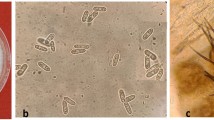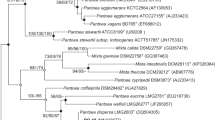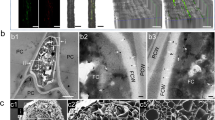Abstract
Bacterium malvacearum, the causative agent of ‘black-arm’, or angular leaf-spot disease of the cotton plant, has been described in certain recent papers as capable of producing a systemic infection of the plant without, however, causing any manifest symptoms of disease until external conditions become suitable for the development of local lesions. Further, it has been claimed that this infection may extend to the developing ovules, so that internally infected seed results, which on germination may give rise to infected plants, the degree of such infection being conditioned in large measure by the soil temperature prevailing at the time of germination.
This is a preview of subscription content, access via your institution
Access options
Subscribe to this journal
Receive 51 print issues and online access
$199.00 per year
only $3.90 per issue
Buy this article
- Purchase on Springer Link
- Instant access to full article PDF
Prices may be subject to local taxes which are calculated during checkout
Similar content being viewed by others
Author information
Authors and Affiliations
Rights and permissions
About this article
Cite this article
STOUGHTON, R. Angular Leaf-Spot Disease of Cotton. Nature 125, 350–351 (1930). https://doi.org/10.1038/125350a0
Issue Date:
DOI: https://doi.org/10.1038/125350a0
Comments
By submitting a comment you agree to abide by our Terms and Community Guidelines. If you find something abusive or that does not comply with our terms or guidelines please flag it as inappropriate.



